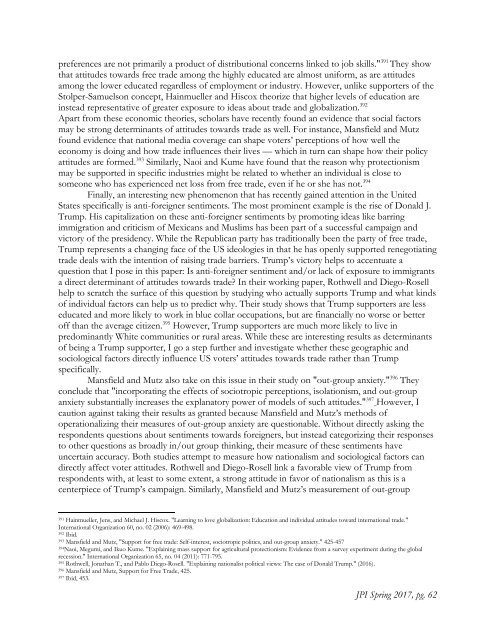SpringIssue_2017
You also want an ePaper? Increase the reach of your titles
YUMPU automatically turns print PDFs into web optimized ePapers that Google loves.
preferences are not primarily a product of distributional concerns linked to job skills." 391 They show<br />
that attitudes towards free trade among the highly educated are almost uniform, as are attitudes<br />
among the lower educated regardless of employment or industry. However, unlike supporters of the<br />
Stolper-Samuelson concept, Hainmueller and Hiscox theorize that higher levels of education are<br />
instead representative of greater exposure to ideas about trade and globalization. 392<br />
Apart from these economic theories, scholars have recently found an evidence that social factors<br />
may be strong determinants of attitudes towards trade as well. For instance, Mansfield and Mutz<br />
found evidence that national media coverage can shape voters’ perceptions of how well the<br />
economy is doing and how trade influences their lives — which in turn can shape how their policy<br />
attitudes are formed. 393 Similarly, Naoi and Kume have found that the reason why protectionism<br />
may be supported in specific industries might be related to whether an individual is close to<br />
someone who has experienced net loss from free trade, even if he or she has not. 394<br />
Finally, an interesting new phenomenon that has recently gained attention in the United<br />
States specifically is anti-foreigner sentiments. The most prominent example is the rise of Donald J.<br />
Trump. His capitalization on these anti-foreigner sentiments by promoting ideas like barring<br />
immigration and criticism of Mexicans and Muslims has been part of a successful campaign and<br />
victory of the presidency. While the Republican party has traditionally been the party of free trade,<br />
Trump represents a changing face of the US ideologies in that he has openly supported renegotiating<br />
trade deals with the intention of raising trade barriers. Trump’s victory helps to accentuate a<br />
question that I pose in this paper: Is anti-foreigner sentiment and/or lack of exposure to immigrants<br />
a direct determinant of attitudes towards trade? In their working paper, Rothwell and Diego-Rosell<br />
help to scratch the surface of this question by studying who actually supports Trump and what kinds<br />
of individual factors can help us to predict why. Their study shows that Trump supporters are less<br />
educated and more likely to work in blue collar occupations, but are financially no worse or better<br />
off than the average citizen. 395 However, Trump supporters are much more likely to live in<br />
predominantly White communities or rural areas. While these are interesting results as determinants<br />
of being a Trump supporter, I go a step further and investigate whether these geographic and<br />
sociological factors directly influence US voters’ attitudes towards trade rather than Trump<br />
specifically.<br />
Mansfield and Mutz also take on this issue in their study on "out-group anxiety." 396 They<br />
conclude that "incorporating the effects of sociotropic perceptions, isolationism, and out-group<br />
anxiety substantially increases the explanatory power of models of such attitudes." 397 However, I<br />
caution against taking their results as granted because Mansfield and Mutz’s methods of<br />
operationalizing their measures of out-group anxiety are questionable. Without directly asking the<br />
respondents questions about sentiments towards foreigners, but instead categorizing their responses<br />
to other questions as broadly in/out group thinking, their measure of these sentiments have<br />
uncertain accuracy. Both studies attempt to measure how nationalism and sociological factors can<br />
directly affect voter attitudes. Rothwell and Diego-Rosell link a favorable view of Trump from<br />
respondents with, at least to some extent, a strong attitude in favor of nationalism as this is a<br />
centerpiece of Trump’s campaign. Similarly, Mansfield and Mutz’s measurement of out-group<br />
391<br />
Hainmueller, Jens, and Michael J. Hiscox. "Learning to love globalization: Education and individual attitudes toward international trade."<br />
International Organization 60, no. 02 (2006): 469-498.<br />
392<br />
Ibid.<br />
393<br />
Mansfield and Mutz, "Support for free trade: Self-interest, sociotropic politics, and out-group anxiety." 425-457<br />
394<br />
Naoi, Megumi, and Ikuo Kume. "Explaining mass support for agricultural protectionism: Evidence from a survey experiment during the global<br />
recession." International Organization 65, no. 04 (2011): 771-795.<br />
395<br />
Rothwell, Jonathan T., and Pablo Diego-Rosell. "Explaining nationalist political views: The case of Donald Trump." (2016).<br />
396<br />
Mansfield and Mutz, Support for Free Trade, 425.<br />
397<br />
Ibid, 453.<br />
JPI Spring <strong>2017</strong>, pg. 62
















